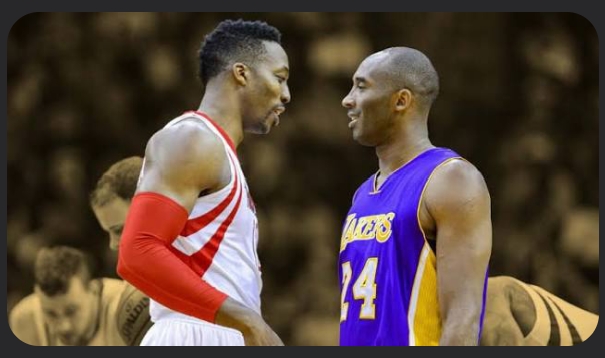By the time Dwight Howard found clarity, it was too late for the conversation to go both ways. But D12 admitted it. Not for a headline, not for closure — but because time, age, and experience had finally untangled what once felt like personal attacks. What Kobe Bryant said to the big man all those years ago echoed differently now.
The pairing was never natural. The chemistry never clicked. And in the middle of it, Bryant — never one to sugarcoat — famously called Howard “soft.” A comment that would follow them both, but mostly Dwight, for years
The word stung back then. The center never hid that. He’d been a franchise player in Orlando, the centerpiece of a Finals run in 2009. Dwight’s persona was playful, even goofy — smiling on the court, dancing in warmups. Bryant didn’t see leadership in that. He saw a lack of edge. But D12 took it personally. Years later, that bitterness cooled into reflection.
I get it now,” Howard said in an interview years later. “So everybody reaches different levels of maturity at different times, and I think at that time, I was ignorant to the level that he was at. I appreciate you Kobe, thank you for saying I was soft. I didn’t realize what you meant till now.”
Their partnership in Los Angeles during the 2012-13 season was built on hype and broken expectations. Bryant was nearing the twilight of his prime, desperate for one last championship run.
Howard was 26, a three-time Defensive Player of the Year and arguably the league’s most dominant big man — but also nursing a bad back, coming off surgery, and adjusting to the weight of L.A. lights.
This was never about who was right or wrong. It was about a mental mismatch — one player consumed by legacy, the other still trying to navigate stardom. Communication failed. Ego got loud. Timing was all off. Kobe was wired for war, expecting everyone to follow.
Dwight wasn’t there yet—not mentally, not emotionally. The gap was too wide. But that didn’t mean there wasn’t respect. Even in silence, there was something mutual underneath all that friction.
By the time the Georgia native arrived in L.A., the Lakers were making a desperate bid to revive their dynasty. They had just landed Steve Nash and traded for Howard in a four-team blockbuster that cost them Andrew Bynum and multiple picks. The expectations were nuclear. So were the egos.
Dwight was coming off surgery for a herniated disc and playing through pain. Nash was injured early and often. Pau Gasol struggled to find his place in Mike D’Antoni’s system. And Bryant — at age 34 — was carrying the weight of the team, grinding through minutes, refusing to concede anything.
The season ended in disaster. A first-round sweep by the Spurs. Bryant tore his Achilles. Howard bolted to Houston in free agency. And the “soft” label stuck like gum to a shoe. Still, the former Laker looks back with clarity.
Even in that chaotic season, with Bryant breathing fire and the media painting him as a misfit, Howard said he found value in the experience. The tension was real, and so was the learning. “Superman” may not have thrived in Purple and Gold the first time around, but it reshaped him.
He’d eventually return to L.A. in 2019 as a role player, more humble, more focused. That time, it worked. Howard helped the Lakers win the 2020 title in the bubble—a championship Bryant never got to see, but one Dwight still dedicates to his memory. There was never hatred—just misunderstanding before growth.

